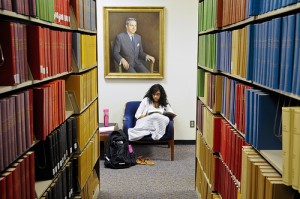I suspect I'm not a rare exception when it comes to juggling multiple tasks as part of my work (and personal) responsibilities. Most people do. The sooner students learn these skills, the better able they'll be to succeed in the outside world -- using those 21st century skills we keep referring to.
Richtel adds that researchers say "periods of rest are critical in allowing the brain to synthesize information, make connections between ideas and even develop the sense of self." I agree that it's just as important to give yourself time to process and think through the onslaught of information coming at you, and part of living the multi-tasking life is figuring out how to carve out time for periods of letting your mind rest, as well as to prioritize which of the many tasks on our list need to be addressed first.
2) Setting examples and guidelines. As example of reckless use of technology, Richtel quotes a few students in the article as saying they play multiple hours of video games after school and on weekends, and one student who sends more than 20,000 texts per month.
"Students say that their parents, worried about the distractions, try to police computer time, but that monitoring the use of cellphones is difficult. Parents may also want to be able to call their children at any time, so taking the phone away is not always an option," Richtel writes.
I think it's important to clarify here the vast difference between the argument for using video games and cell phones as instructional tools compared with allowing limitless texting and unrestricted video-game playing at home. The fact that some parents don't limit the number of texts on their children's cell phone accounts, or the number of hours they spend playing video games should not have any bearing on the very valid ways that the same technologies can enhance the learning process.
3) The genie is out of the bottle. Technology has permeated every part of our lives, and we can't go back in time. Educators who harness the power of technology to help students learn will find it much easier than those who fight it.
In the article, Geoff Diesel, who teaches audio production, has found a way to engage students who were most likely to skip class and homework.

Alternately, teacher Marcia Blondel has resorted to asking students to read in class to make sure they've actually read the material. “I hope this will motivate you to read on your own," she says to the class. Reilly, the principal, "hopes that the two can meet — that computers can be combined with education to better engage students and can give them technical skills without compromising deep analytical thought."
As I posted last week, that's exactly what educator Catlin Tucker is doing, using "blended learning" techniques to engage her students: she allots time in class to teach the content, then assigns thought-provoking questions to be answered online at home, then uses those online comments to spur discussion in class the next day. For her, technology and teaching are perfect companions.
4) Power play. A commenter to Richtel's article writes:
"Today’s kids have to be in a situation where they are controlling something and school is set up so that students control nothing. It’s passive. School is all about learning delay of gratification literally endlessly."
Another commenter weighs in:
"Whether we like it or not, history and culture start in the past and moves toward the future. That means young people have to meet history - and their elders - on the elders' terms, not vice versa."
These two comments go to the heart of the tension at how technology and the Internet are disturbing the precarious balance of power between teachers and students, learners and pedagogues. The fact that educators are 1) trying to meet students on their turf and 2) giving up absolute control of information they want students to learn is disquieting at best, heretical at worst. The very nexus of Web 2.0 -- collaboration -- places young people square in the center of their own educational success.
In the accompanying video that goes along with the feature, teacher Katy Barnicle from Morristown High School admits that in the past, she always "wanted to be very aware and in control," but that now "I don't need to know all the outcomes. I can have kids teach me and we can learn alongside each other."
Another teacher says: "The way we were taught isn't necessarily the way we should teach students. We need to use technology to enhance our lessons. I'd like to see more teachers engaged in what students are engaging in."
Spoken like people who see clearly how the learning process has and will evolve.
5) Education vs. entertainment. Richtel writes: "Several recent studies show that young people tend to use home computers for entertainment, not learning, and that this can hurt school performance, particularly in low-income families."
Again, I think it's important to point out that although kids can easily be consumed with gratuitously violent games like Angry Birds or Call of Duty, as many or more fun, educational games do exist. The two experiences, learning and enjoying, don't have to be -- and some would argue, should not be -- mutually exclusive.
Audrey Miller, an art teacher at Oceanview School, puts it beautifully in the accompanying video:



